Climate change: Scotland to set faster target for net-zero emissions
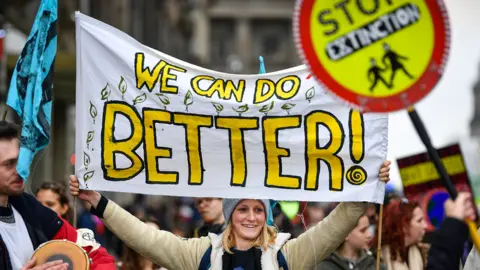 Getty Images
Getty ImagesThe Scottish government will legislate to reduce greenhouse gas emissions to net-zero by 2045 after receiving fresh advice from an expert panel.
The Committee on Climate Change (CCC) urged that Scotland set the target five years ahead of the UK as a whole.
The panel says Scotland has more potential sites for carbon capture and a greater landmass for tree planting.
It came after a report to the UN last year urged the world to go "further and faster" in tackling climate change.
And on Sunday First Minister Nicola Sturgeon declared a "climate emergency" in her speech to the SNP party conference.
Net-zero is the point where the same volume of greenhouse gases is being emitted as is being absorbed through offsetting techniques like forestry.
Despite being low-tech, trees are still the most powerful tool in removing carbon dioxide from the atmosphere through photosynthesis which turns the gas into oxygen.
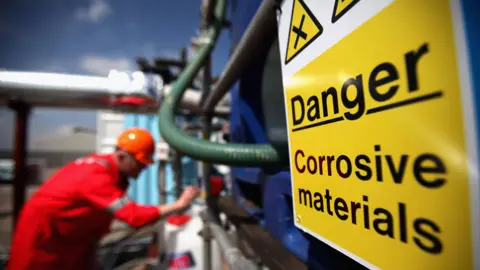 Getty Images
Getty ImagesCommittee chairman Lord Deben said: "Scotland has been a leader within the UK with many of its policies to tackle climate change.
"By setting a strong net-zero target for 2045 it can continue that leadership on the world stage.
"It will be tough, but it can be done and Scotland's strong track record positions it well to succeed."

What does net-zero mean?
 PA
PAThe terms carbon neutral and net-zero are often used interchangeably but there are differences.
Carbon dioxide (CO2) is the most abundant greenhouse gas but there are others which the Scottish government counts and they are not all carbon-based.
Therefore, some climate change campaigners prefer the term net-zero as it includes not just CO2 and methane but also nitrous oxide, which is emitted during agricultural and industrial activities as well as from fossil fuels.
Simply being carbon neutral would not stop global warming because these other gases are also harmful to the atmosphere.
Perhaps an even better term would be "climate neutral".

Scotland's current target, set in the Climate Change Act, is to reduce emissions by 80% by 2050 compared with benchmark levels from 1990.
A new bill currently going through the Scottish Parliament aims to increase that target to 90%.
It will now be amended so MSPs can vote on the new target of net-zero by 2045.
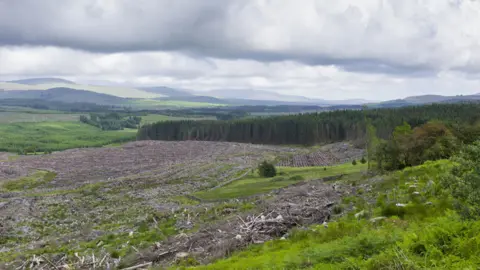 Tim Graham/Getty Images
Tim Graham/Getty Images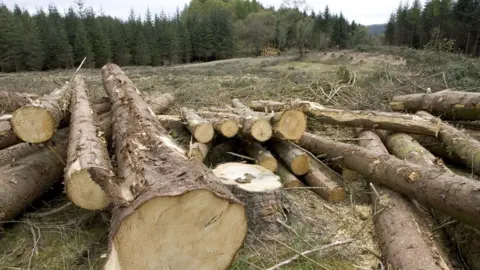 Photofusion/Getty Images
Photofusion/Getty ImagesMinisters have said they would aim for net-zero when there is a "credible pathway to achieve it".
Scotland's environment secretary Roseanna Cunningham said: "There is a global climate emergency and people across Scotland have been calling, rightly, for more ambition to tackle it and safeguard our planet for future generations.
"Having received independent, expert advice that even higher targets are now possible, and given the urgency required on this issue, I have acted immediately to set a target for net-zero greenhouse gas emissions for 2045 which will see Scotland become carbon neutral by 2040."
She called on the UK government to follow Scotland's lead and warned that everyone needs to take action, including businesses, schools and communities.

Calls to abandon air departure tax
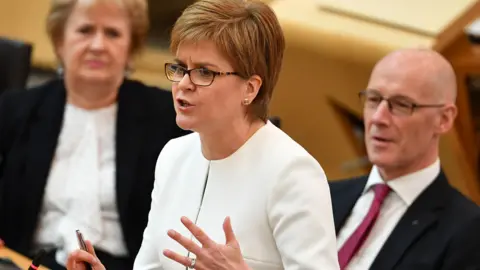 Getty Images
Getty ImagesDuring First Minister's Questions, Nicola Sturgeon was challenged on proposals for a devolved air departure tax - which would be 50% lower than the current air passenger duty.
Last month the Scottish government said legal issues surrounding the plans would not be resolved until after April 2020.
Alison Johnstone of the Scottish Greens called on Ms Sturgeon to abandon the "unfair and environmentally damaging" proposals.
She said the money should instead be invested in active travel and public transport.
Scottish Labour leader Richard Leonard also urged Ms Sturgeon to drop her commitment to the plans "once and for all".
The first minister stressed that the cut in aviation tax was not going ahead this year.
She said the government would have to review every policy in order to meet the new climate change targets.
"Setting targets is one thing, having the policy programme in place to meet them is what matters," she added.

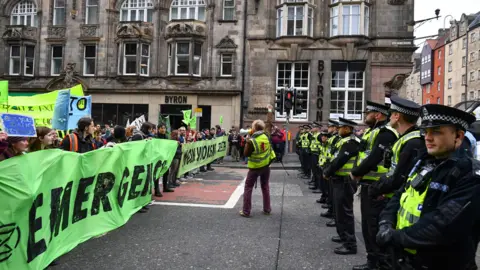 Getty Images
Getty ImagesThe CCC advice recommends a net-zero target of 2050 for the UK as a whole, with Wales urged to reduce emissions by 95% in the same time-frame.
To achieve it, the report says a fifth of agricultural land needs to shift to alternative uses that support emissions reductions such as forestry or biomass production.
It adds that carbon capture and storage would be crucial.
As well as the 2045 aim, the committee advises interim targets of a 70% reduction in emissions by 2030 and a 90% drop by 2040.
In the most recent audit, for 2016, Scottish emissions were 49% below 1990 levels.
The CCC calculates that the new target can be achieved at an annual cost of around 1-2% of GDP.
A drop in the cost of technologies like offshore wind and batteries for electric vehicles means that is a similar price tag as the one previously attached to the 80% target.
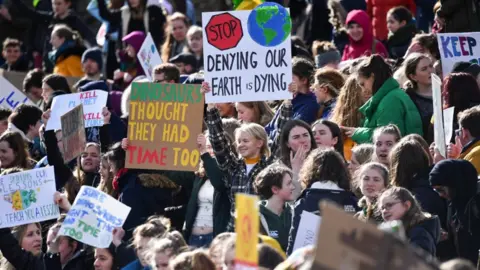 Getty Images
Getty ImagesThe UK government's energy minister Greg Clark said the CCC report "recognises the work we've done to lay the foundations to build a net-zero economy".
He added: "Few subjects unite people across generations and borders like climate change and I share the passion of those wanting to halt its catastrophic effects.
"One of our proudest achievements as a country is our position as a world-leader in tackling this global challenge - being the first country to raise the issue on the international stage, introduce long-term legally-binding climate reduction targets and cutting emissions further than all other G20 countries."

What is your diet's carbon footprint?
All figures for each food in the calculator are global averages. If you cannot view the food calculator, click to launch the interactive content.

The industry body Oil & Gas UK said it was committed to working with both governments on a practical response to the report.
Chief executive Deirdre Michie said the reductions must be achieved "without sacrificing security and affordability of energy supply for consumers" and in ways which "do not disadvantage UK industries against their international competitors".
Mike Robinson from Stop Climate Chaos Scotland said the CCC report was "hugely welcome advice".
 Reuters
Reuters"The growing climate movement, from NGOs, youth strikes to Extinction Rebellion, is sending a strong message to our political leaders that rhetoric just isn't good enough," he added.
"It's now up to MSPs to show they are listening to public concern and reflect the ambition of this exciting report in the Climate Change Bill currently going through parliament."
The CCC calls for the new targets to be achieved purely through domestic efforts.
Some countries, like Norway and Sweden, fund international offsetting schemes which count towards their measurements.
It also says the target can only be achieved if policy delivery is ramped up significantly, including an earlier deadline than 2040 - as the UK government has proposed - for the phase-out of fossil fuel cars.
Creating new forests through afforestation also needs to increase to 20,000 hectares a year across the UK, increasing to 27,000 by 2027.
